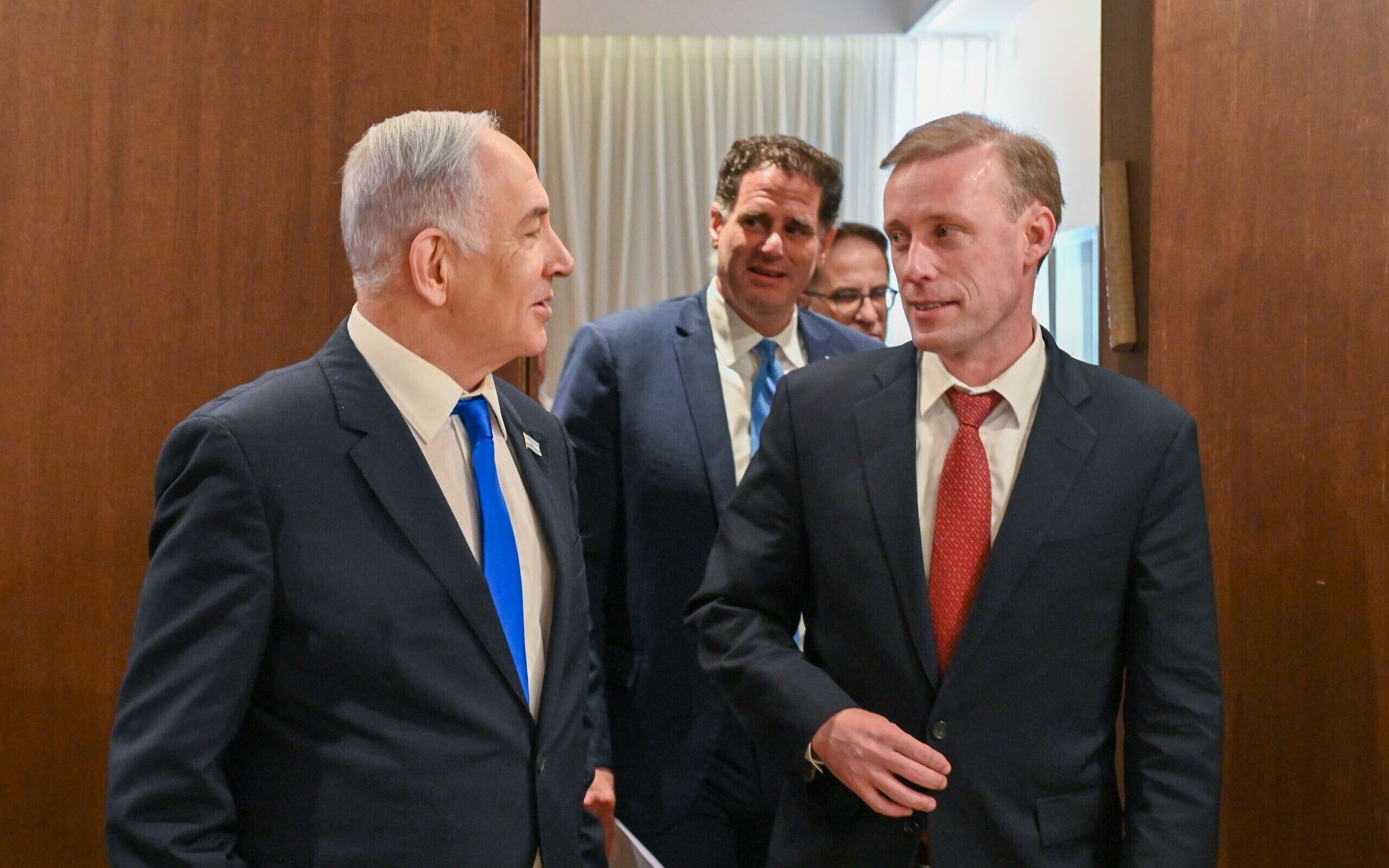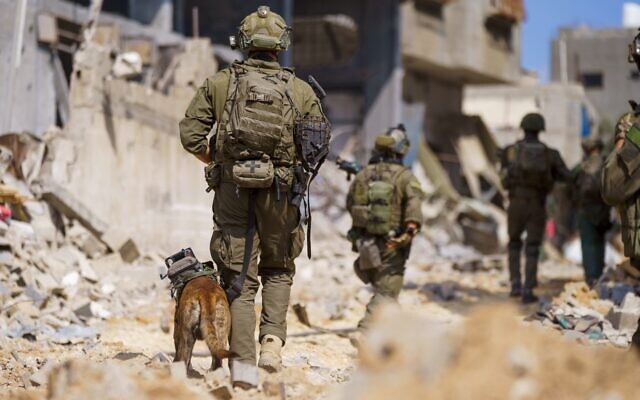



Visiting US National Security Adviser Jake Sullivan laid out to Prime Minister Benjamin Netanyahu on Sunday the opportunity currently available for Israel to normalize relations with Saudi Arabia if Jerusalem agrees to a pathway to a future Palestinian state.
Sullivan arrived in Israel earlier in the day after holding “constructive” talks on the Biden administration’s “comprehensive vision for an integrated Middle East region” with Crown Prince Mohammed bin Salman in Dammam, Saudi Arabia, the White House said.
The kingdom said the two discussed a “semi-final” version of a wide-ranging security agreement between the countries. The agreements are considered a major part of Washington’s efforts to bring Riyadh around to recognizing the State of Israel for the first time — efforts complicated by the ongoing war in Gaza.
The effort appears to be a non-starter in Israel, with Netanyahu reiterating again Sunday that he would not accept a Palestinian state, even if it meant a Saudi normalization deal. Riyadh and Washington have been clear that movement toward statehood is needed to reach an agreement.
This did not stop Sullivan from again pitching the idea to Netanyahu, as he briefed him on his meetings in Saudi Arabia and on “the potential that may now be available for Israel, as well as the Palestinian people,” said the White House readout.
Saudi Arabia has long called for an independent Palestinian state to be created along Israel’s 1967 borders, with East Jerusalem as its capital. However, that is likely untenable for Netanyahu, whose government hinges on support from hardliners who oppose a two-state solution and support Israeli settlements on lands Palestinians want for that state.
Sullivan also met with President Isaac Herzog, National Security Council chair Tzachi Hanegbi and Strategic Affairs Minister Ron Dermer, also discussing with them the ongoing efforts to secure the release of the hostages in Gaza and “the enduring defeat of Hamas,” according to the White House.
The two goals appear at odds, given that the US is aiming to turn the hostage deal it is currently brokering into a permanent ceasefire that would likely leave Hamas in Gaza in some form.
But US officials told The Times of Israel last week that the diplomatic initiative it is advancing with international partners will marginalize the terror group and that it is the only alternative Israel has to permanently occupying Gaza without assistance from its Arab allies in stabilizing the enclave.
Sullivan did not meet with Defense Minister Yoav Gallant or war cabinet minister Benny Gantz, both of whom publicly criticized Netanyahu’s handling of the war over the past week.
Herzog and Sullivan discussed ongoing efforts to see the return of hostages in Gaza, a source close to the president told The Times of Israel.
He also underscored “the importance of the contribution of the United Arab Emirates and Cyprus to the maritime channel delivering civilian aid to the population of Gaza,” according to the source.
Sullivan also convened a modified meeting of the US-Israel Strategic Consultative Group, which met several times virtually to discuss Israel’s potential offensive in the southern Gaza city of Rafah.
In Sunday’s in-person meeting with top Israeli security officials, Sullivan was briefed on the IDF’s latest operations in Gaza. “The two sides discussed methods to ensure the defeat of Hamas while minimizing harm to civilians,” the US readout said, highlighting a sticking point in ties, as Washington feels Israel has not done nearly enough on this issue. IDF estimates put the number of civilians killed in the war at 20,000, compared to some 15,000 combatants.
During this meeting, Sullivan reiterated the US position against a major military offensive in Rafah due to fears that it’ll cause further harm to the civilians sheltering there, while risking irreparable damage to ties with fellow ally Egypt, which shares a border with Rafah.
“Sullivan proposed a series of concrete measures to ensure more aid surges into Gaza, including through all available crossings, and through the multinational humanitarian maritime corridor,” the US readout said.
“Sullivan briefed on US support for Israeli efforts to find and bring to justice Hamas’s leaders in Gaza,” the readout added, highlighting that Washington still supports targeted operations against Hamas’s leaders, including in Rafah.
The top Biden aide briefed Israeli counterparts on talks the US has held with Egypt “to fully secure its border with Rafah and to secure the continued flow of humanitarian assistance through Kerem Shalom, even as talks proceed on reopening the Rafah Crossing.”
US officials have said that an expanded Israeli operation in Rafah risks harming Egypt’s willingness to cooperate on these efforts, as Cairo doesn’t want to be seen as collaborating with Israel against the interests of Palestinians, who are being forced to relocate again in Gaza due to the offensive.
Kerem Shalom has become the main entry point for aid, with Rafah being shut down after Israeli forces took over the area earlier this month. Egypt has indicated it will not coordinate on bringing aid through Rafah until the troops depart.
Sullivan also stressed steps Israel can take to improve existing deconfliction mechanisms so that aid workers are protected, days after another pair of humanitarian staff were killed in Gaza.
Sullivan highlighted the need for Israel to “establish fixed corridors inside Gaza to ensure aid is able to reach all those in need throughout Gaza.”
The US national security adviser “reaffirmed the need for Israel to connect its military operations to a political strategy that can ensure the lasting defeat of Hamas, the release of all the hostages and a better future for Gaza,” the readout says, pointing out a major criticism the US has had of Prime Minister Benjamin Netanyahu, arguing that his refusal to plan for who will replace Hamas in Gaza has led to the stagnation of Israel’s military gains.
With the recovery of four hostage’s bodies on Friday, it is believed that 124 people abducted by Hamas on October 7 remain in Gaza, with the deaths of 37 of them confirmed by Israeli authorities.
Indirect talks with Hamas in Cairo broke down earlier this month, as the Gaza terror group continues to insist on an end to the war as a condition for the release of the hostages it holds.
Meanwhile, IDF troops are slowly expanding their limited operation in Rafah, a move Netanyahu insists is the only way to pressure Hamas leader Yahya Sinwar to agree to a deal.
The war in the Gaza Strip and its influence on relations with Saudi Arabia gained urgency on Saturday when Gantz issued an ultimatum on a number of topics, including Saudi normalization, as a condition for keeping his National Unity party in the emergency government, which he joined after the war started. In response, the Prime Minister’s Office issued a statement saying that Netanyahu opposes “establishing a Palestinian state that will inevitably be a terror state.”
Agencies contributed to this report.



